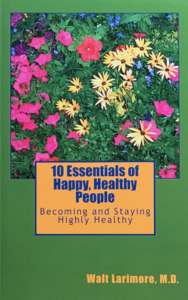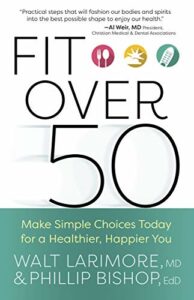Ask Dr. Walt – Episode #01 – Five habits to live ten years longer

The Writer’s Studio 01 – My Interview with Mega-Best-Selling Author: Jerry B. Jenkins (Part 1 of 2)
April 14, 2023
“One of the best WWII books I’ve ever read” — One Year Anniversary of “At First Light”
April 19, 2023In this episode of Ask Dr. Walt, Dr. Walt Larimore shares five behavioral skills that can help you “live 12 to 14 years longer than others.” You can click below to watch a video of the show, or I’ve put the show transcript below if you’d prefer that.
From 2021-2022, I was honored to host a TV show on LiftableTV, “Ask Dr. Walt.” Today, I’m releasing Episode #1, FIVE HABITS TO LIVE TEN YEARS LONGER OR MORE. I hope you’ll enjoy it.
You can learn more about this topic in my best-selling book, 10 Essentials of Happy, Healthy People: Becoming and staying highly healthy or Fit over 50: Make Simple Choices for a Healthier, Happier You.
CLICK HERE FOR 10 E’S CLICK HERE FOR Fo50
Disclaimer: The “Ask Dr. Walt” show is designed for entertainment purposes to give information on various medical conditions, treatments, and procedures for your personal knowledge and to help you be a more informed consumer of medical and health services.
SHOW TRANSCRIPT
Living Longer and Better — Five Habits to Live Ten Years or More Longer
TEASE:
On this episode of “Ask Dr. Walt:” five habits to live ten years longer and better. Does this sound too good to be true? Stay with us and I’ll share the secrets to a longer, healthier, and happier life.
OPEN:
Hi, everyone. I’m family physician Dr. Walt Larimore and welcome to our very first episode of “Ask Dr. Walt” on LiftableTV. My residency in family and sports medicine was at Duke and I’ve had the privilege of caring for thousands of patients and delivering over 1500 babies during my forty-year career.
I’ve had more than one patient tell me, “Doc, if I’d have known I was going to live this long, I would have taken better care of myself.” Today I want to explain to you how to do just that by putting into practice five habits.
Researchers using National data report:
| “People using these five behavioral skills live 12 to 14 years longer than others.”
“If you’re fifty years old and are doing these five behaviors, you’ll live almost 50 percent longer than same-aged people who aren’t doing any of these.” National Health and Nutrition Examination Survey |
And those who choose to NOT practice these five lifestyles make up about three-quarters of premature cardiovascular deaths and over half of premature deaths from cancer.
Now, before you get suspicious, I’m not here to sell you supplements, or medical food, or a diet. Like your family physician, I just want you to have the information you need to become more highly healthy.
So, let’s cut to the chase. What are the five most healthy habits you and your family can put into practice starting today?
| 1. never smoke
2. maintain a normal weight BMI 3. participate in thirty or more minutes per day of moderate-to-vigorous physical activity at least five days a week 4. drink no alcohol or limit alcohol intake 5. consume a high-quality, nutrient-dense diet |
Let’s spend a few minutes talking about each of these.
| 1. never smoke |
Although “never smoking” is the best category, “stopping smoking” puts you in a much healthier category. And although cigarette smoking has now reached the “lowest level ever recorded among US adults,” new forms of smoking have increased including e-cigarettes or vaping, cigarillos, hookah, clove and menthol cigarettes, etc. According to the American Cancer Society:
| “People often think some forms are safe and don’t cause health problems. This isn’t true. There is no safe form of tobacco.”
“Smoking is still the leading cause of preventable disease and death in the US, accounting for about one in five deaths.” American Cancer Society |
If you use tobacco and you want to live a longer life with greater quality of life, you must develop a strategy to stop. And the sooner you do, the better you’ll feel and smell.
| 2. maintain a normal weight BMI |
BMI, or body mass index, is based upon a calculation that takes into account your height and weight. There are gobs of BMI calculators on the Internet and your BMI will show that you’re either normal, overweight, extremely overweight, obese, or morbidly obese.
Obesity in most of the world, especially in the US is epidemic. A recent report by the National Center for Health Statistics showed that,
| “Both men and women gained on average a whopping 24 pounds from 1960 to 2000.”
“Over the last 20 years adults have gained an average of another 7 to 8 pounds.” National Center for Health Statistics |
Recent reports from the CDC tell us over one third of US adults are obese. Another one-third overweight. In other words, over two-thirds of adults are overweight or obese. And unfortunately, our children are following in our footsteps.
If you’re extremely overweight or obese, there’s help and hope. If you want to live a longer life with greater quality of life, you must develop a strategy to reduce your weight. And the sooner you do, the better you’ll feel and look.
| 3. participate in thirty or more minutes of physical activity at least five days a week |
Some experts believe the most common health problem in America today is sitting disease. What they mean is that prolonged sitting, also called sedentary living, has been shown by researchers to play a significant role in many of the most troublesome health issues of our time, from obesity and heart disease to diabetes and depression.
According to a study from the University of Cambridge:
| “Prolonged sitting, is twice as likely to lead to premature death as being obese.”
The University of Cambridge |
Being unfit on an exercise test has a worse prognosis, as far as death, than being hypertensive, being diabetic, or being a current smoker.
| Regular exercise:
· increases how long you live, · reduces stress, fatigue, and disability, · reduces the risk of heart disease and premature death, · reduces your risk of several types of cancer, and · improves your mental health, how you look, and how you feel. |
| 4. drink no or limited alcohol |
If you’re going to drink alcohol at all, if you’re a woman, limit your alcohol consumption to one drink per day, and if you’re a man, limit it to two drinks per day.
Too much alcohol can disturb sleep, affect your mental health, increase your risk for some types of cancer. It can also affect your brain health and increase your risk of dementia.
| 5. consume a high-quality, nutrient-dense diet |
Last, but certainly not least, eat well. Increasing the good foods, good carbohydrates, good fats, and good proteins improves your weight, sleep, energy, heart health, brain health . . . I could go on and on.
For example, the AARP’s Global Council on Brain Health concluded:
| “A diet rich in fruits and vegetables is associated with better brain health.”
“Those eating at least one serving of leafy greens a day had a slower rate of decline on tests of memory and thinking skills than did people who rarely or never ate these vegetables.” AARP’s Global Council on Brain Health |
| “Regular consumers of such veggies as kale, spinach, collard greens and lettuce enjoyed a mental edge that was the equivalent of 11 years in age.”
AARP’s Global Council on Brain Health |
The worst nutrition plan is called the:
| The Southern-Style Diet is rich in:
· fried food, · processed meats, · cheesy casseroles, · eggs, and · high amounts of salt, sugar, and saturated fat. Harvard Heart Letter |
In fact, researchers say this diet is especially deadly to African Americans by increasing blood pressure up to killer levels.
What’s the best nutrition plan? According to the nutritional and health experts gathered together each year by U.S. News and World Reports:
| The Mediterranean-style diet is rich in: · vegetables and fruits, |
· fish,
· whole grains,
· legumes (beans, lentils, peas, and peanuts),
· nuts,
· and is low in meat and dairy.
U.S. News and World Reports
U.S. News also rates:
| The Mediterranean-style diet is: · The best diet overall, |
· The best diet for healthy eating, and
· The easiest diet to follow.
U.S. News and World Reports
Well, we’ve only just scratched the surface of this topic and in future shows we’ll dive deeper into each of these five lifesaving, life-prolonging, and life-enhancing habits:
| 1. don’t smoke, and if you do, stop.
2. maintain a normal weight and if you’re overweight or obese figure out ways that work for you to reverse that over time, even a little bit at a time. 3. If you don’t move very much, get started and try to work up to at least 150 minutes a week of physical activity 4. drink no or limited alcohol, and if you drink more than this, now’s the time to cut back, and finally 5. find a high-quality, nutrition plan that is tasty and works for you and your family. |
Okay, enough from me. Let’s take some questions from you guys:
Q) What if I can’t do all five of these health habits you suggest. What if I do only four? What if I already have heart disease or cancer?
A) Great question. The short answer is that in all of these scenarios any one or two or three or four of these behaviors will improve the length and quality of your life — even if you have heart disease or cancer.
Q) Dr. Walt, the life expectancy in America has been going up almost every year. Does all this stuff you’re sharing really make any difference or not?
A) It turns out there’s some truth to what you say, in that from 1940 until a few years ago, the life expectancy in America increased almost every year. In fact from 63 to almost 79 years of age. There were several reasons for this: improvements in living standards, improved medical treatments, and reduction in smoking.
But over the last few years, life expectancy has been falling almost every year. In fact, globally, the US now ranks forty-third when it comes to life expectancy. The three countries ranked highest for life expectancy at birth were Monaco, Japan, and Singapore – all with life expectancy of greater than 85 years.
One reason for this drop is our epidemic of obesity and sedentary activity. Another is growing drug and alcohol abuse.
But, the main reason our life expectancy is dropping is that the percent of people adhering to these five low-risk lifestyles I’ve told you about is decreasing.
In fact, over the last couple of decades, the percent of folks adhering to these five low-risk habits has shrunk in half from over 15 percent to well under 8 percent.
Q) Heart disease runs in my family. Our doctor says our genetics are what is killing folks in our extended family at a young age. I’m not sure it’s even worth trying this stuff.
A) I’m so glad you asked this question. Cardiologists have actually evaluated families just like yours, who have genetic variants for heart disease and premature death.
And, guess what? They found out that even if you have a genetic risk for heart disease, there’s a simple way to combat it: Exercise!”
Among participants determined to have the highest genetic risk for cardiovascular disease, the highest level of cardiorespiratory
fitness was associated with an almost 50 percent lower risk for coronary heart disease!
Q) I work in an office where I’m sitting all day. My days are long. I just don’t have time to exercise.
A) I understand. As a physician and writer, I could end up in a chair most of the day also.
Researchers tell us that Americans are sitting an average of 13 hours a day. Some say that our office chairs are worse for our health than smoking and kills more people than HIV.
So, what can we chair slugs do? I’d recommend you consider what I do.
Move as much as you can and whenever you can. Try to build up to standing up at work for at least two hours a day—and work your way toward four.
The average office worker sits for about 10 hours throughout an average workday. Even just standing burns more calories than sitting.
Have walking or standing meetings. Stand and walk during phone calls. Walk at lunch. Park further away and walk.
The additional muscle activity is linked to lower rates of heart attacks, strokes, and diabetes, so the benefits of standing could go beyond weight control.
Hippocrates said, “Walking is man’s best medicine,” and science and Dr. Walt agrees.
Q) You talked about the Mediterranean Diet. I’ve traveled a lot and in each country that borders the Mediterranean Sea, diets can be as different as night and day. Which country’s diet do I pick?
A) You’re exactly right. There isn’t a specific Mediterranean diet. Italians eat differently from Greeks, who eat differently from the Spanish. But folks in these countries have a not-so-surprising secret: a lifestyle that is active combined with a diet low in red meat, sugar, and saturated fat, while high in fresh fruits and vegetables, whole grains, beans, nuts, and other healthful foods while saving sweets and red meat for special occasions. As a result, the people who follow this style of nutrition live longer and suffer fewer chronic diseases, cardiovascular diseases, and cancers than most Americans.
Q) Dr. Walt, what’s the definition of “one drink” when it comes to alcohol?
A) The National Institute on Alcohol Abuse & Alcoholism defines what they call “moderate drinking” as a maximum of 14 drinks for men and seven drinks for women per week. The NIAAA defines one drink as:
- 12 ounces of regular beer at around 5 percent alcohol
- 8 to 9 ounces of malt liquor at around 7 percent alcohol
- 5 ounces of table wine at around 12 percent alcohol
- 5 ounces of distilled spirits, such as gin, rum, whiskey, tequila, or vodka
Well, we need to close our time. If you’re interested in reading more about the information from today’s program, there are two of my books you might want to consider picking up at my website, www.DrWalt.com.
- Fit over 50: Make Simple Choices for a Healthier, Happier You, or
- 10 Essentials of Happy, Healthy People: Becoming and staying highly healthy
I hope you’ll drop in next week when I’ll be telling you the secrets for having cardiovascular health. I’ll tell you about the five numbers most of you don’t know and all of you need to know to dramatically reduce your and your loved one’s risk of heart disease, heart attack, heart failure, or stroke.
But until we’re next together, to quote the Apostle John, “Dear friend, I pray that you may enjoy good health and that all may go well with you, even as your soul is getting along well.”
You can learn more about this topic in my best-selling book, 10 Essentials of Happy, Healthy People: Becoming and staying highly healthy or Fit over 50: Make Simple Choices for a Healthier, Happier You.
Disclaimer: The “Ask Dr. Walt” show is designed for entertainment purposes to give information on various medical conditions, treatments, and procedures for your personal knowledge and to help you be a more informed consumer of medical and health services.
© Copyright WLL, INC. 2023. This blog provides healthcare tips and advice that you can trust about a wide variety of general health information only and is not intended to be a substitute for professional medical advice, diagnosis, or treatment from your regular physician. If you are concerned about your health, take what you learn from this blog and meet with your personal doctor to discuss your concerns.









2 Comments
Love your website!!!!! Spent time with SUSAN last night planing our 50 year Lee High class reunion,lol. Hola to Barb.😃
LuLu,
Thanks for the kind words and feedback. Sue said y’all had a ball together. Have fun and make memories. And, come visit sometime!
Walt